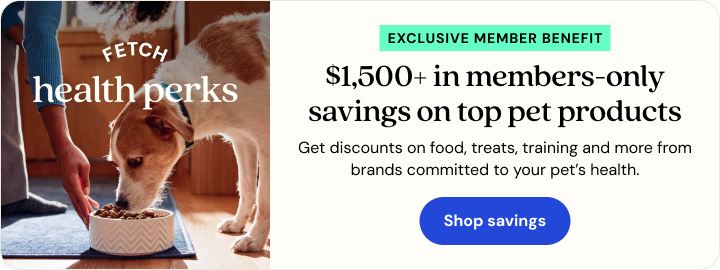.jpg)
Welcome to pet parenthood! We’re here to help make this transition as smooth as possible by giving you vet-recommended tools and tips for your new puppy.
Scheduling your first vet visit should be a top priority, says Fetch Chief Veterinary Officer, Dr. Aliya McCullough. Puppies need rabies and distemper vaccines, which are mandatory. Dogs are usually given distemper vaccines at 6 to 8 weeks and rabies vaccines when your pup is 12 weeks old.
Other vaccines depend on your pup’s lifestyle, like vaccines for Lyme disease, kennel cough, canine influenza or leptospirosis. Besides giving the necessary vaccines, a veterinarian can ensure your dog doesn’t have common health issues like foreign body ingestion, wounds, parvovirus or respiratory infections, skin mites, intestinal parasites, low blood sugar, hernias or hip dysplasia.
If you haven’t already done so, take the following quick steps to ensure your space is puppy-ready:
Here are the essentials you’ll need — all at exclusive, members-only prices:
✔️ Dog food & treats
Your veterinarian can recommend the best food option for your new pup depending on their breed, size and health status. Talk to your vet and then be sure to check out Fetch Health Perks to shop members-only pricing from leading pet food brands.
✔️ Training
Featured Fetch Health Perk from Dogo. Fetch members get 50% off dog training for an entire year through this link (accessible on mobile only).
✔️ Grooming & cleaning supplies
Featured Fetch Health Perk from Mrs. Meyer’s Clean Day for Pets. Fetch members get 10% off every order through this link. Use FETCH10 at checkout.
✔️ Smart collar
Featured Fetch Heath Perk from Fi GPS Smart Collar. Fetch members get a free collar and six month subscription through this link.




It’s exciting to have a multi-pup household. Dr. McCullough has some tips to get your current dog all set for the arrival of their new sibling:
It’s essential to establish a routine on your puppy’s first few days and week at home because it helps them know what to expect and will inevitably help with socializing and training, Dr. McCullough says. Their daily plan should include time for naps, play, feeding and training, she explains. Another key part of their routine is getting them to sleep in their crate from day one.
“It is ideal for puppies to sleep in a crate for naps and at night starting from the first night,” she explains. “This helps set a routine and establishes their crate as a calm and restful place.”
Cheers to the start of a new relationship with your puppy!
The Dig, Fetch Pet Insurance's expert-backed editorial, answers all of the questions you forget to ask your vet or are too embarrassed to ask at the dog park. We help make sure you and your best friend have more good days, but we’re there on bad days, too.

up to 90% of vet bills – covered.
Every 6 seconds, a pet parent gets a $1000+ vet bill. Care for your pet & your wallet with Fetch.
Get your price